The Algarve is, after the Lisbon Metropolitan Area, the second region in the country with the highest rate of diagnosis of people with HIV infection (Human Immunodeficiency Virus). Thus, in 2019, the number of cases diagnosed per 100.000 inhabitants was 13,7 in the district of Lisbon and 13,5 in the district of Faro.
In absolute terms, however, the Algarve is much less prominent, with 59 new cases of HIV infection (aged 15 years and over) diagnosed in 2019, being surpassed by Lisbon (391), North (162) and Center ( 110).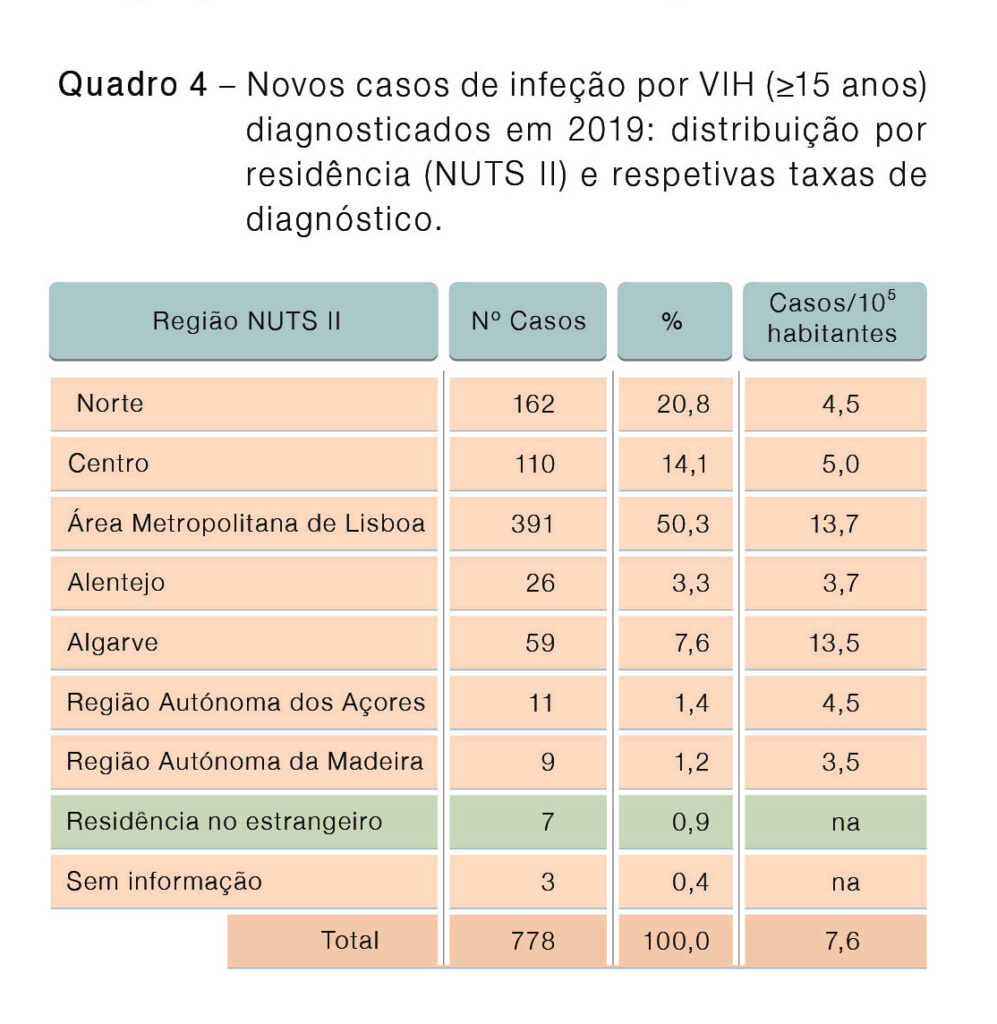 Nevertheless, data on HIV infection, which, if left untreated, can give rise to AIDS (Acquired Immunodeficiency Syndrome), are encouraging in Portugal, as the number of new cases dropped again in 2019, maintaining the downward trend that had already been verified since 2000. In other words, far gone is the year 1999, when 3358 cases of HIV infection were diagnosed in Portugal.
Nevertheless, data on HIV infection, which, if left untreated, can give rise to AIDS (Acquired Immunodeficiency Syndrome), are encouraging in Portugal, as the number of new cases dropped again in 2019, maintaining the downward trend that had already been verified since 2000. In other words, far gone is the year 1999, when 3358 cases of HIV infection were diagnosed in Portugal. 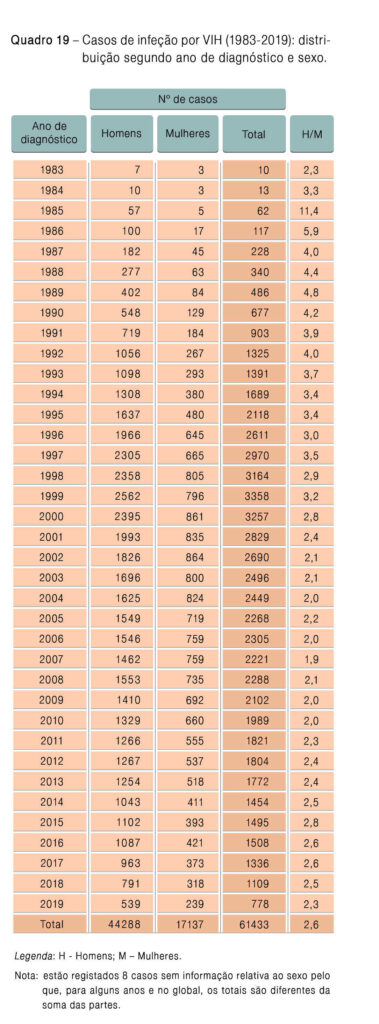
Today, December 1st, World AIDS Day, the report “HIV and AIDS in Portugal – 2020”, produced by the Directorate-General for Health (DGS) and by the National Institute of Health Doctor Ricardo Jorge (INSA), de 1 from January to December 31, 2019, 778 new cases of HIV infection were diagnosed across the country, 331 fewer cases than in 2018.
The DGS and INSA report addresses the specific case of the city of Portimão, which is one of the 10 Portuguese cities to integrate the initiative "Cities on the fast track to end the HIV epidemic", which aims to involve municipalities in the fight against the epidemic and in meeting the goals 90-90-90 of the Joint United Nations Program on HIV/AIDS – UNAIDS. In addition to the Algarve city of Portimão, Almada, Amadora, Cascais, Lisbon, Loures, Odivelas, Oeiras, Portimão, Porto and Sintra are also participating.
As can be seen in the graph, in Portimão, from 2014 to 2018, 70 cases were diagnosed, which results in an average of 25,3 diagnosed cases per 100 inhabitants~. Dispelling some myths that still persist in society, the data indicate that the most frequent form of transmission is heterosexual (55,7%).
In fact, the Algarve has five municipalities among the 15 municipalities in mainland Portugal with the highest average rate of new HIV diagnoses (2015-2019): Portimão (rate of 26,0 diagnosed cases per 100.000 inhabitants), Albufeira (24,0, XNUMX), Faro (22,6) and Lagos (17,7).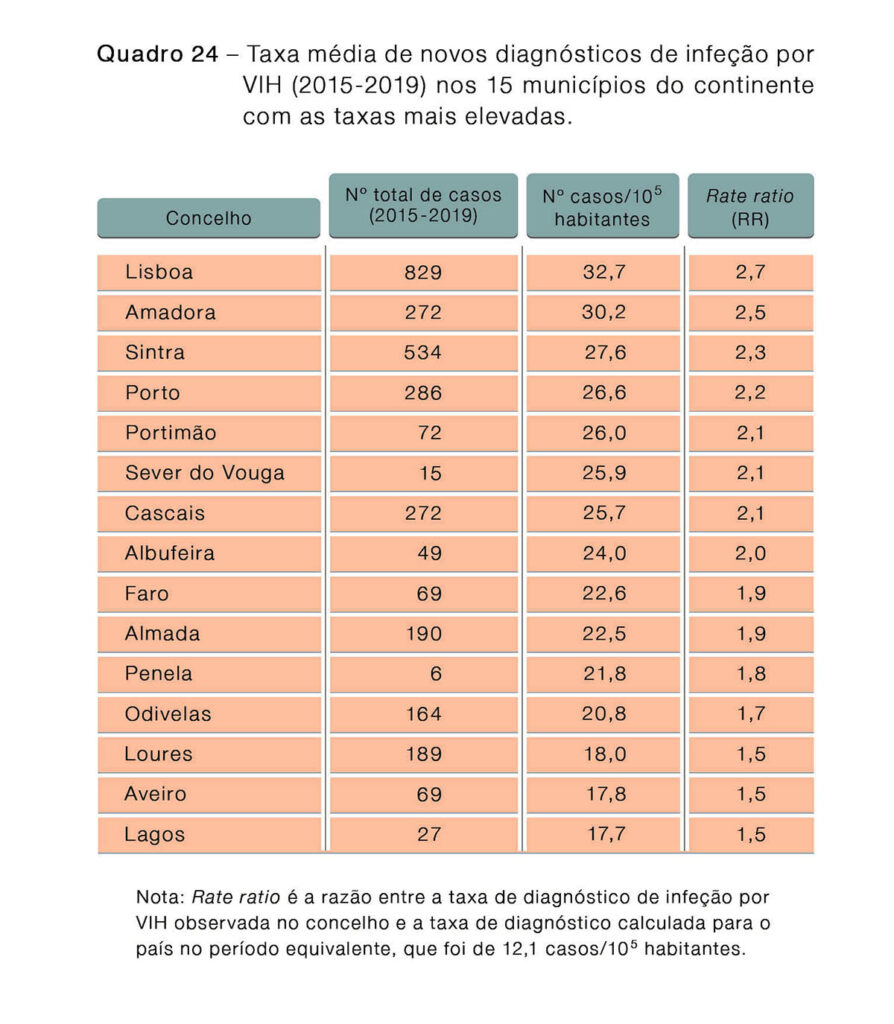 But the report by DGS and INSA highlights that, in addition to the reduction in the annual number of new diagnoses of infection, this year there is also a percentage of late diagnoses of less than 50%. The report indicates the percentage of late diagnoses rose from 54,4% in 2018 to 49,7%, which "demonstrates the effort that has been made to diagnose more and earlier."
But the report by DGS and INSA highlights that, in addition to the reduction in the annual number of new diagnoses of infection, this year there is also a percentage of late diagnoses of less than 50%. The report indicates the percentage of late diagnoses rose from 54,4% in 2018 to 49,7%, which "demonstrates the effort that has been made to diagnose more and earlier."
The majority (69,3%) of new cases of HIV infection were in men (2,3 cases for every reported case in women) and the median age at diagnosis was 38 years. In 24,1% of new cases, individuals were 50 years old or older.
Although heterosexual transmission remains the most frequent nationwide, cases in Men Who Have Sex with Men (MSM) constituted the majority of new diagnoses in men (56,7%).
With regard to the area of residence, 50,4% of individuals resided in the Metropolitan Area of Lisbon (13,7 cases/100.000 inhabitants) and the Algarve region had the second highest rate of diagnoses (13,5 cases/100.000 inhabitants) population).
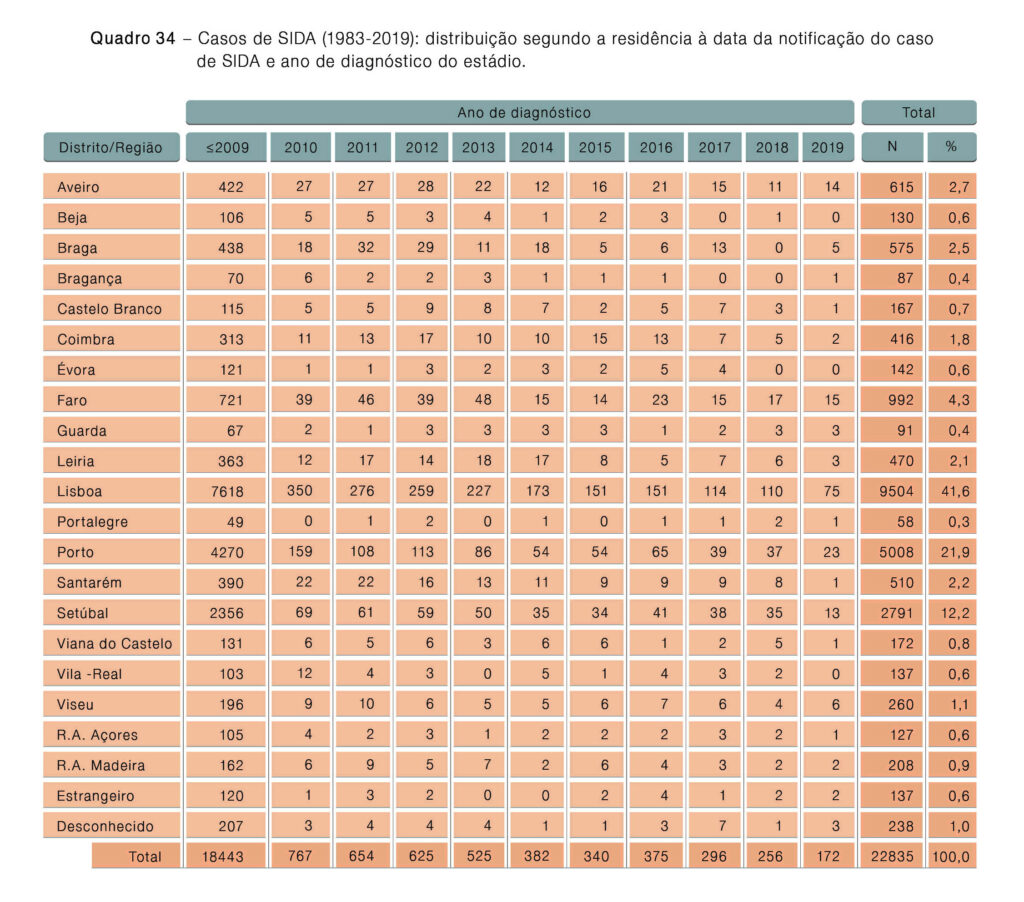 In the period under review, no cases of HIV transmission in children were reported.
In the period under review, no cases of HIV transmission in children were reported.
Regarding deaths, 197 deaths were reported in HIV-infected patients during 2019, and in 46,2% of these cases people had already reached the AIDS stage.
Analyzing the accumulated data, from the beginning of the records, in 1983, until December 31, 2019, 61.433 cases of HIV infection were identified in Portugal, of which 22.835 reached the AIDS stage.
Between 2009 and 2018, there was a 47% reduction in the number of new cases of HIV infection and 65% in new cases of AIDS.
According to the DGS, «to obtain better results with an impact on early diagnosis, it is important to strengthen and maintain community responses, encourage the expansion of rapid testing in community pharmacies to other regions of the country, disseminate the different options for carrying out the screening, including the availability of self-testing and promoting the literacy of the population and health professionals'.
Therefore, initiatives such as “Cities on the fast track to end the HIV epidemic”, in which Portimão participates, are considered by the DGS as “essential in the pursuit of the outlined objectives”.
Click here to see the full report “HIV and AIDS in Portugal – 2020” (PDF)
Help us to do the Sul Informação!
Contribute your donation so that we can continue to make your journal!
Click here to support us (Paypal)
Or use our IBAN PT50 0018 0003 38929600020 44

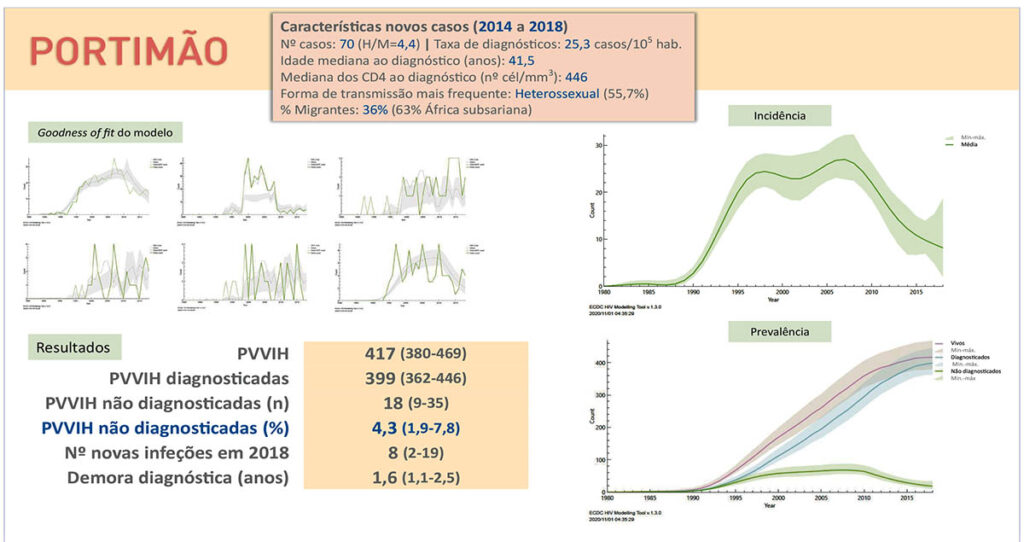
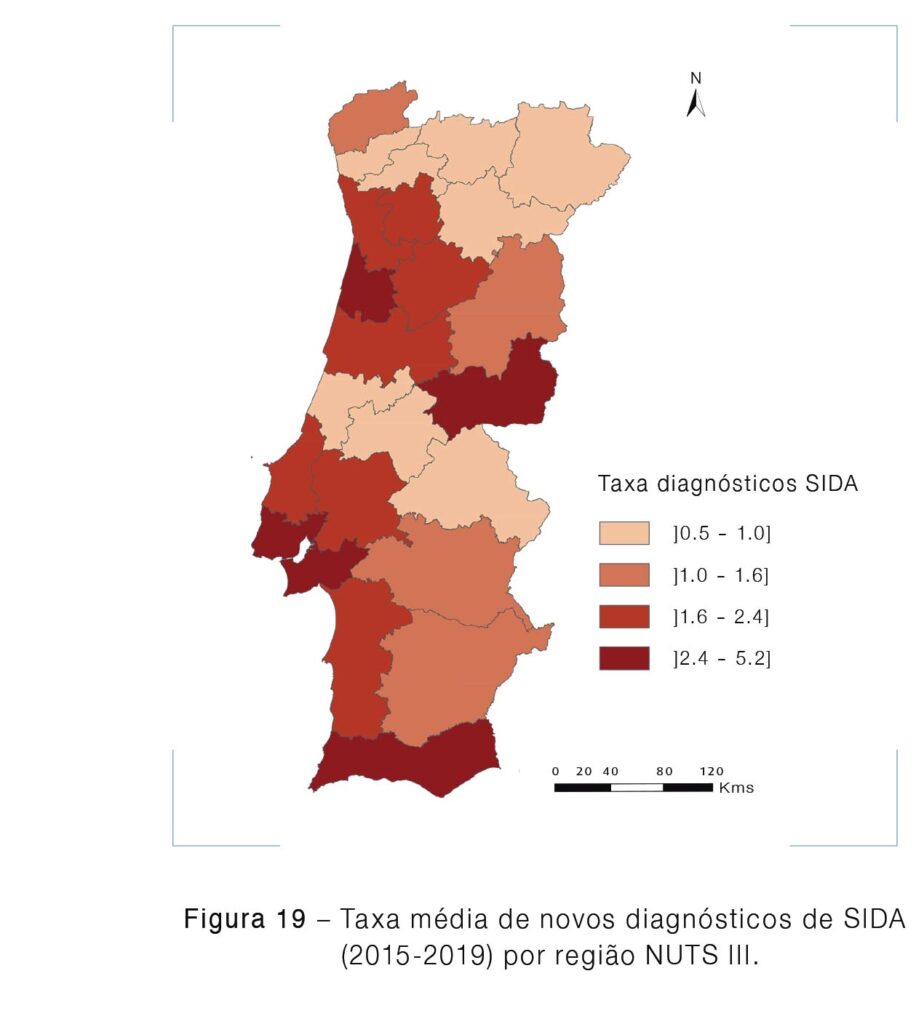


















Comments